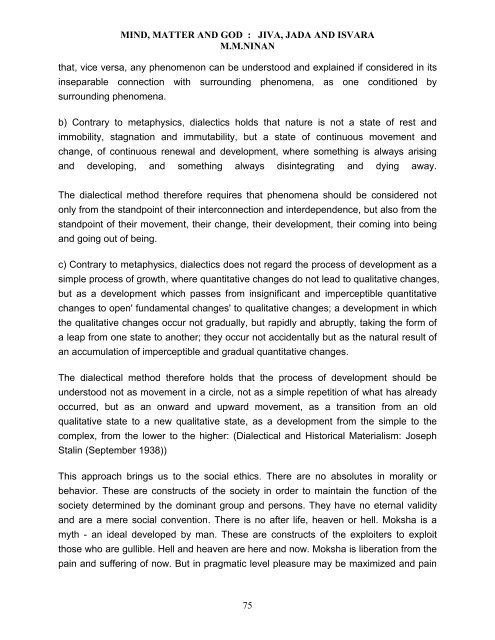Jiva
You also want an ePaper? Increase the reach of your titles
YUMPU automatically turns print PDFs into web optimized ePapers that Google loves.
MIND, MATTER AND GOD : JIVA, JADA AND ISVARA<br />
M.M.NINAN<br />
that, vice versa, any phenomenon can be understood and explained if considered in its<br />
inseparable connection with surrounding phenomena, as one conditioned by<br />
surrounding phenomena.<br />
b) Contrary to metaphysics, dialectics holds that nature is not a state of rest and<br />
immobility, stagnation and immutability, but a state of continuous movement and<br />
change, of continuous renewal and development, where something is always arising<br />
and developing, and something always disintegrating and dying away.<br />
The dialectical method therefore requires that phenomena should be considered not<br />
only from the standpoint of their interconnection and interdependence, but also from the<br />
standpoint of their movement, their change, their development, their coming into being<br />
and going out of being.<br />
c) Contrary to metaphysics, dialectics does not regard the process of development as a<br />
simple process of growth, where quantitative changes do not lead to qualitative changes,<br />
but as a development which passes from insignificant and imperceptible quantitative<br />
changes to open' fundamental changes' to qualitative changes; a development in which<br />
the qualitative changes occur not gradually, but rapidly and abruptly, taking the form of<br />
a leap from one state to another; they occur not accidentally but as the natural result of<br />
an accumulation of imperceptible and gradual quantitative changes.<br />
The dialectical method therefore holds that the process of development should be<br />
understood not as movement in a circle, not as a simple repetition of what has already<br />
occurred, but as an onward and upward movement, as a transition from an old<br />
qualitative state to a new qualitative state, as a development from the simple to the<br />
complex, from the lower to the higher: (Dialectical and Historical Materialism: Joseph<br />
Stalin (September 1938))<br />
This approach brings us to the social ethics. There are no absolutes in morality or<br />
behavior. These are constructs of the society in order to maintain the function of the<br />
society determined by the dominant group and persons. They have no eternal validity<br />
and are a mere social convention. There is no after life, heaven or hell. Moksha is a<br />
myth - an ideal developed by man. These are constructs of the exploiters to exploit<br />
those who are gullible. Hell and heaven are here and now. Moksha is liberation from the<br />
pain and suffering of now. But in pragmatic level pleasure may be maximized and pain<br />
75


















